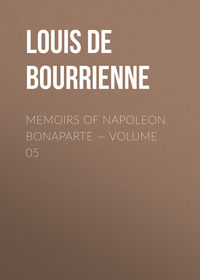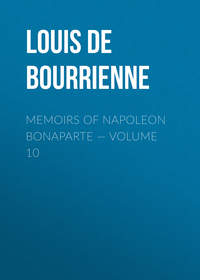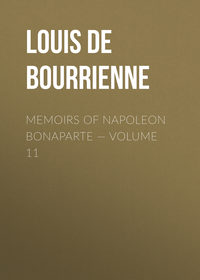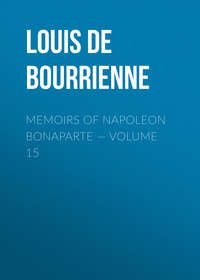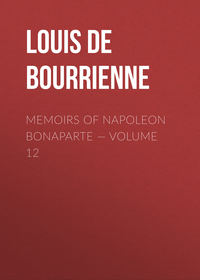 полная версия
полная версияMemoirs of Napoleon Bonaparte — Volume 03
General Berthier, after repeated entreaties, had obtained permission to return to France. The 'Courageuse' frigate, which was to convey him home, was fitting out at Alexandria; he had received his instructions, and was to leave Cairo on the 29th of January, ten days before Bonaparte's departure for Syria. Bonaparte was sorry to part with him; but he could not endure to see an old friend, and one who had served him well in all his campaigns, dying before his eyes, the victim of nostalgia and romantic love. Besides, Berthier had been for some time past, anything but active in the discharge of his duties. His passion, which amounted almost to madness, impaired the feeble faculties with which nature had endowed him. Some writers have ranked him in the class of sentimental lovers: be this as it may, the homage which Berthier rendered to the portrait of the object of his adoration more frequently excited our merriment than our sensibility.
One day I went with an order from Bonaparte to the chief of his staff, whom I found on his knees before the portrait of Madame Visconti, which was hanging opposite the door. I touched him, to let him know I was there. He grumbled a little, but did not get angry.
The moment was approaching when the two friends were to part, perhaps forever. Bonaparte was sincerely distressed at this separation, and the chief of his staff was informed of the fact. At a moment when it was supposed Berthier was on his way to Alexandria, he presented himself to the General-in-Chief. "You are, then, decidedly going to Asia?" said he.—"You know," replied the General, "that all is ready, and I shall set out in a few days."—"Well, I will not leave you. I voluntarily renounce all idea of returning to France. I could not endure to forsake you at a moment when you are going to encounter new dangers. Here are my instructions and my passport." Bonaparte, highly pleased with this resolution, embraced Berthier; and the coolness which had been excited by his request to return home was succeeded by a sincere reconciliation.
Louis Bonaparte, who was suffering from the effects of the voyage, was still at Alexandria. The General-in-Chief, yielding to the pacific views of his younger brother, who was also beginning to evince some symptoms of nostalgia, consented to his return home. He could not, however, depart until the 11th of March 1799. I felt the absence of Louis very much.
On his return to France Louis passed through Sens, where he dined with Madame de Bourrienne, to whom he presented a beautiful shawl, which General Berthier had given me. This, I believe, was the first Cashmere that had ever been seen in France. Louis was much surprised when Madame de Bourrienne showed him the Egyptian correspondence, which had been seized by the English and printed in London. He found in the collection some letters addressed to himself, and there were others, he said, which were likely to disturb the peace of more than one family on the return of the army.
On the 11th of February 1799 we began our march for Syria, with about 12,000 men. It has been erroneously stated that the army amounted to only 6000: nearly that number was lost in the course of the campaign. However, at the very moment we were on our way to Syria, with 12,000 men, scarcely as many being left in Egypt, the Directory published that, "according to the information which had been received," we had 60,000 infantry and 10,000 cavalry; that the army had doubled its numbers by battles; and that since our arrival in Egypt, we had lost only 300 men. Is history to be written from such documents?
We arrived, about four o'clock in the afternoon, at Messoudiah, or, "the Fortunate Spot." Here we witnessed a kind of phenomenon, which was not a little agreeable to us. Messoudiah is a place situated on the coast of the Mediterranean, surrounded with little dunes of very fine sand, which the copious rains of winter readily penetrate. The rain remains in the sand, so that on making with the fingers holes of four or five inches in depth at the bottom of these little hills, the water immediately flows out. This water was, indeed, rather thick, but its flavour was agreeable; and it would have become clear if we could have spared time to allow it to rest and deposit the particles of sand it contained.
It was a curious spectacle to behold us all lying prostrate, digging wells in miniature; and displaying a laughable selfishness in our endeavours to obtain the most abundant source. This was a very important discovery to us. We found these sand-wells at the extremity of the desert, and it contributed, in no small degree, to revive the courage of our soldiers; besides, when men are, as was the case with us, subject to privations of every kind, the least benefit which accrues inspires the hope of a new advantage. We were approaching the confines of Syria, and we enjoyed by anticipation, the pleasure we were about to experience, on treading a soil which, by its variety of verdure and vegetation, would remind us of our native land. At Messoudiah we likewise possessed the advantage of bathing in the sea, which was not more than fifty paces from our unexpected water-supply.
Whilst near the wells of Messoudiah, on the way to El-Arish, I one day saw Bonaparte walking alone with Junot, as he was often in the habit of doing. I stood at a little distance, and my eyes, I know not why, were fixed on him during their conversation. The General's countenance, which was always pale, had, without my being able to divine the cause, become paler than usual. There was something convulsive in his features—a wildness in his look, and he several times struck his head with his hand. After conversing with Junot about a quarter of an hour he quitted him and came towards me. I never saw him exhibit such an air of dissatisfaction, or appear so much under the influence of some prepossession. I advanced towards him, and as soon as we met, he exclaimed in an abrupt and angry tone, "So! I find I cannot depend upon you.—These women!—Josephine! —if you had loved me, you would before now have told me all I have heard from Junot—he is a real friend—Josephine!—and I 600 leagues from her— you ought to have told me.—That she should thus have deceived me!—'Woe to them!—I will exterminate the whole race of fops and puppies!—As to her—divorce!—yes, divorce! a public and open divorce!—I must write! —I know all!—It is your fault—you ought to have told me!"
These energetic and broken exclamations, his disturbed countenance and altered voice informed me but too well of the subject of his conversation with Junot. I saw that Junot had been drawn into a culpable indiscretion; and that, if Josephine had committed any faults, he had cruelly exaggerated them. My situation was one of extreme delicacy. However, I had the good fortune to retain my self-possession, and as soon as some degree of calmness succeeded to this first burst, I replied that I knew nothing of the reports which Junot might have communicated to him; that even if such reports, often the offspring of calumny, had reached my ear, and if I had considered it my duty to inform him of them, I certainly would not have selected for that purpose the moment when he was 600 leagues from France. I also did not conceal how blamable Junot's conduct appeared to me, and how ungenerous I considered it thus rashly to accuse a woman who was not present to justify or defend herself; that it was no great proof of attachment to add domestic uneasiness to the anxiety, already sufficiently great, which the situation of his brothers in arms, at the commencement of a hazardous enterprise, occasioned him.
Notwithstanding these observations, which, however, he listened to with some calmness, the word "divorce" still escaped his lips; and it is necessary to be aware of the degree of irritation to which he was liable when anything seriously vexed him, to be able to form an idea of what Bonaparte was during this painful scene. However, I kept my ground. I repeated what I had said. I begged of him to consider with what facility tales were fabricated and circulated, and that gossip such as that which had been repeated to him was only the amusement of idle persons; and deserved the contempt of strong minds. I spoke of his glory. "My glory!" cried he. "I know not what I would not give if that which Junot has told me should be untrue; so much do I love Josephine! If she be really guilty a divorce must separate us for ever. I will not submit to be a laughing-stock for all the imbeciles in Paris. I will write to Joseph; he will get the divorce declared."
Although his agitation continued long, intervals occurred in which he was less excited. I seized one of these moments of comparative calm to combat this idea of divorce which seemed to possess his mind. I represented to him especially that it would be imprudent to write to his brother with reference to a communication which was probably false. "The letter might be intercepted; it would betray the feelings of irritation which dictated it. As to a divorce, it would be time to think of that hereafter, but advisedly."
These last words produced an effect on him which I could not have ventured to hope for so speedily. He became tranquil, listened to me as if he had suddenly felt the justice of my observations, dropped the subject, and never returned to it; except that about a fortnight after, when we were before St. Jean d'Acre, he expressed himself greatly dissatisfied with Junot, and complained of the injury he had done him by his indiscreet disclosures, which he began to regard as the inventions of malignity. I perceived afterwards that he never pardoned Junot for this indiscretion; and I can state, almost with certainty, that this was one of the reasons why Junot was not created a marshal of France, like many of his comrades whom Bonaparte had loved less. It may be supposed that Josephine, who was afterwards informed by Bonaparte of Junot's conversation, did not feel particularly interested in his favour[16]. He died insane on the 27th of July 1813.
[16]—[However indiscreet Junot might on this occasion have shown himself in interfering in so delicate a matter, it is pretty certain that his suspicions were breathed to no other ear than that of Bonaparte himself. Madame Junot, in speaking of the ill-suppressed enmity between her husband and Madame Bonaparte, says that he never uttered a word even to her of the subject of his conversation with the General-in-Chief to Egypt. That Junot's testimony, however, notwithstanding the countenance it obtained from Bonaparte's relations, ought to be cautiously received, the following passage from the Memoirs of the Duchesse d'Abrantès, vol. i. p. 250, demonstrative of the feelings of irritation between the parties, will show:
"Junot escorted Madame Bonaparte when she went to join the General-in-Chief in Italy. I am surprised that M. de Bourrienne has omitted mentioning this circumstance in his Memoirs. He must have known it, since he was well acquainted with everything relating to Josephine, and knew many facts of high interest in her life at this period and subsequently. How happens it too that he makes no mention of Mademoiselle Louise, who might be called her 'demoiselle de compagnie' rather than her 'femme de chambre'? At the outset of the journey to Italy she was such a favourite with Josephine that she dressed like her mistress, ate at table with her, and was in all respects her friend and confidante.
"The journey was long, much too long for Junot, though he was very much in love with Mademoiselle Louise. But he was anxious to join the army, for to him his General was always the dearest of mistresses. Junot has often spoken to me, and to me alone, of the vexations he experienced on this journey. He might have added to his circumstantial details relative to Josephine the conversation he is reported to have had with Bonaparte to Egypt; but he never breathed a word on the subject, for his character was always noble and generous. The journey to Italy did not produce the effect which usually arises from such incidents in common life; namely, a closer friendship and intimacy between the parties. On the contrary, Madame Bonaparte from that moment evinced some degree of ill-humour towards Junot, and complained with singular warmth of the want of respect which he had shown her, in making love to her 'femme de chambre' before her face."
According to 'Erreurs (tome i. pp. 4, 50) Junot was not then in Syria. On 10th February Napoleon was at Messoudiah. Junot only arrived from Egypt at Gaza on the 25th February. Madame d'Abrantès (ii. 32) treats this conversation as apocryphal. "This (an anecdote of her own) is not an imaginary episode like that, for example, of making a person speak at Messoudiah who never was there."]—
Our little army continued its march on El-Arish, where we arrived on the 17th of February. The fatigues experienced in the desert and the scarcity of water excited violent murmurs amongst the soldiers during their march across the isthmus. When any person on horseback passed them they studiously expressed their discontent. The advantage possessed by the horsemen provoked their sarcasms. I never heard the verses which they are said to have repeated, but they indulged in the most violent language against the Republic, the men of science, and those whom they regarded as the authors of the expedition. Nevertheless these brave fellows, from whom it was not astonishing that such great privations should extort complaints, often compensated by their pleasantries for the bitterness of their reproaches.
Many times during the crossing of the isthmus I have seen soldiers, parched with thirst, and unable to wait till the hour for distribution of water, pierce the leathern bottles which contained it; and this conduct, so injurious to all, occasioned numerous quarrels.
El-Arish surrendered on the 17th of February. It has been erroneously stated that the garrison of this insignificant place, which was set at liberty on condition of not again serving against us, was afterwards found amongst the besieged at Jaffa. It has also been stated that it was because the men composing the El-Arish garrison did not proceed to Bagdad, according to the capitulation, that we shot them at Jaffa. We shall presently see the falsehood of these assertions.
On the 28th of February we obtained the first glimpse of the green and fertile plains of Syria, which, in many respects, reminded us of the climate and soil of Europe. We now had rain, and sometimes rather too much. The feelings which the sight of the valleys and mountains called forth made us, in some degree, forget the hardships and vexations of an expedition of which few persons could foresee the object or end. There are situations in life when the slightest agreeable sensation alleviates all our ills.
On the 1st of March we slept at Ramleh[17], in a small convent occupied by two monks, who paid us the greatest attention. They gave us the church for a hospital. These good fathers did not fail to tell us that it was through this place the family of Jesus Christ passed into Egypt, and showed us the wells at which they quenched their thirst. The pure and cool water of these wells delighted us.
[17]—[Ramleh, the ancient Arimathea, is situated at the base of a chain of mountains, the eastern extremity of which is washed by the Persian Gulf, and the western by the Mediterranean.—Bourrienne.]—
We were not more than about six leagues from Jerusalem. I asked the General whether he did not intend to direct his march by the way of that city, so celebrated in many respects. He replied, "Oh no! Jerusalem is not in my line of operations. I do not wish to be annoyed by mountaineers in difficult roads. And, besides, on the other side of the mountain I should be assailed by swarms of cavalry. I am not ambitious of the fate of Cassius."
We therefore did not enter Jerusalem, which was not disturbed by the war. All we did was to send a written declaration to the persons in power at Jerusalem, assuring them that we had no design against that country, and only wished them to remain at peace. To this communication no answer was returned, and nothing more passed on the subject[18].
[18]—[Sir Walter Scott says, speaking of Bonaparte, that he believes that little officer of artillery dreamed of being King of Jerusalem. What I have just stated proves that he never thought of such a thing. The "little officer of artillery" had a far more splendid dream in his head.—Bourrienne.]—
We found at Ramleh between two and three hundred Christians in a pitiable state of servitude, misery, and dejection. On conversing with them I could not help admiring how much the hope of future rewards may console men under present ills. But I learned from many of them that they did not live in harmony together. The feelings of hatred and jealousy are not less common amongst these people than amongst the better-instructed inhabitants of rich and populous cities.
CHAPTER XVIII
1799.
Arrival at Jaffa—The siege—Beauharnais and Croisier—Four thousand prisoners—Scarcity of provisions—Councils of war—Dreadful necessity—The massacre—The plague—Lannes and the mountaineers— Barbarity of Djezzar—Arrival at St Jean d'Acre, and abortive attacks—Sir Sidney Smith—Death of Caffarelli—Duroc wounded— Rash bathing—Insurrections in Egypt.
On arriving before Jaffa, where there were already some troops, the first person I met was Adjutant-General Gresieux, with whom I was well acquainted. I wished him good-day, and offered him my hand. "Good God! what are you about?" said he, repulsing me with a very abrupt gesture; "you may have the plague. People do not touch each other here!" I mentioned the circumstance to Bonaparte, who said, "If he be afraid of the plague, he will die of it." Shortly after, at St. Jean d'Acre, he was attacked by that malady, and soon sank under it.
On the 4th of March we commenced the siege of Jaffa. That paltry place, which, to round a sentence, was pompously styled the ancient Joppa, held out only to the 6th of March, when it was taken by storm, and given up to pillage. The massacre was horrible. General Bonaparte sent his aides de camp Beauharnais and Croisier to appease the fury of the soldiers as much as possible, and to report to him what was passing. They learned that a considerable part of the garrison had retired into some vast buildings, a sort of caravanserai, which formed a large enclosed court. Beauharnais and Croisier, who were distinguished by wearing the 'aide de camp' scarf on their arms, proceeded to that place. The Arnauts and Albanians, of whom these refugees were almost entirely composed, cried from the windows that they were willing to surrender upon an assurance that they would be exempted from the massacre to which the town was doomed; if not, they threatened to fire on the 'aides de camp', and to defend themselves to the last extremity. The two officers thought that they ought to accede to the proposition, notwithstanding the decree of death which had been pronounced against the whole garrison, in consequence of the town being taken by storm. They brought them to our camp in two divisions, one consisting of about 2500 men, the other of about 1600.
I was walking with General Bonaparte, in front of his tent, when he beheld this mass of men approaching, and before he even saw his 'aides de camp' he said to me, in a tone of profound sorrow, "What do they wish me to do with these men? Have I food for them?—ships to convey them to Egypt or France? Why, in the devil's name, have they served me thus?" After their arrival, and the explanations which the General-in-Chief demanded and listened to with anger, Eugène and Croisier received the most severe reprimand for their conduct. But the deed was done. Four thousand men were there. It was necessary to decide upon their fate. The two aides de camp observed that they had found themselves alone in the midst of numerous enemies, and that he had directed them to restrain the carnage. "Yes, doubtless," replied the General-in-Chief, with great warmth, "as to women, children, and old men—all the peaceable inhabitants; but not with respect to armed soldiers. It was your duty to die rather than bring these unfortunate creatures to me. What do you want me to do with them?" These words were pronounced in the most angry tone.
The prisoners were then ordered to sit down, and were placed, without any order, in front of the tents, their hands tied behind their backs. A sombre determination was depicted on their countenances. We gave them a little biscuit and bread, squeezed out of the already scanty supply for the army.
On the first day of their arrival a council of war was held in the tent of the General-in-Chief, to determine what course should be pursued with respect to them. The council deliberated a long time without coming to any decision.
On the evening of the following day the daily reports of the generals of division came in. They spoke of nothing but the insufficiency of the rations, the complaints of the soldiers—of their murmurs and discontent at seeing their bread given to enemies who had been withdrawn from their vengeance, inasmuch as a decree of death, in conformity with the laws of war, had been passed on Jaffa. All these reports were alarming, and especially that of General Bon, in which no reserve was made. He spoke of nothing less than the fear of a revolt, which would be justified by the serious nature of the case.
The council assembled again. All the generals of division were summoned to attend, and for several hours together they discussed, under separate questions, what measures might be adopted, with the most sincere desire to discover and execute one which would save the lives of these unfortunate prisoners.
(1.) Should they be sent into Egypt? Could it be done?
To do so, it would be necessary to send with them a numerous escort, which would too much weaken our little army in the enemy's country. How, besides, could they and the escort be supported till they reached Cairo, having no provisions to give them on setting out, and their route being through a hostile territory, which we had exhausted, which presented no fresh resources, and through which we, perhaps, might have to return,
(2.) Should they be embarked?
Where were the ships?—Where could they be found? All our telescopes, directed over the sea, could not descry a single friendly sail. Bonaparte, I affirm, would have regarded such an event as a real favour of fortune. It was, and—I am glad to have to say it, this sole idea, this sole hope, which made him brave, for three days, the murmurs of his army. But in vain was help looked for seaward. It did not come.
(3.) Should the prisoners be set at liberty?
They would then instantly proceed to St. Jean d'Acre to reinforce the pasha, or else, throwing themselves into the mountains of Nablous, would greatly annoy our rear and right-flank, and deal out death to us, as a recompense for the life we had given them. There could be no doubt of this. What is a Christian dog to a Turk? It would even have been a religious and meritorious act in the eye of the Prophet.
(4.) Could they be incorporated, disarmed, with our soldiers in the ranks?
Here again the question of food presented itself in all its force. Next came to be considered the danger of having such comrades while marching through an enemy's country. What might happen in the event of a battle before St. Jean d'Acre? Could we even tell what might occur during the march? And, finally, what must be done with them when under the ramparts of that town, if we should be able to take them there? The same embarrassments with respect to the questions of provisions and security would then recur with increased force.
The third day arrived without its being possible, anxiously as it was desired, to come to any conclusion favourable to the preservation of these unfortunate men. The murmurs in the camp grew louder—the evil went on increasing—remedy appeared impossible—the danger was real and imminent. The order for shooting the prisoners was given and executed on the 10th of March. We did not, as has been stated, separate the Egyptians from the other prisoners. There were no Egyptians.
Many of the unfortunate creatures composing the smaller division, which was fired on close to the seacoast, at some distance from the other column, succeeded in swimming to some reefs of rocks out of the reach of musket-shot. The soldiers rested their muskets on the sand, and, to induce the prisoners to return, employed the Egyptian signs of reconciliation in use in the country. They came back; but as they advanced they were killed, and disappeared among the waves.



